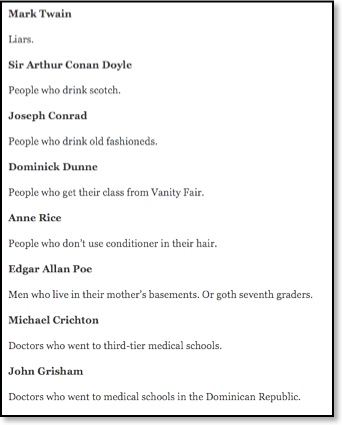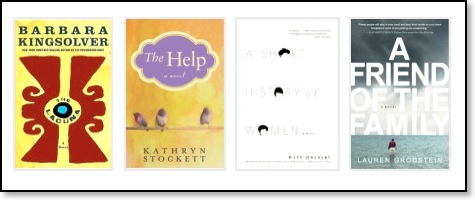fiction
Paul Theroux on fiction in the age of eBooks
04/27/10 10:28 Filed in: publishing
| ebooks
TA:
What
does the advent of the e-reader mean for reading—for
the health of narrative storytelling as a form, for
the market for fiction, for the future of books?
E-readers certainly make it easier to tote lots of
novels and other texts while traveling. But don’t we
lose something—in sustained concentration, or in a
sense of permanence, or in the notion of a book as an
art object—in the migration away from the
codex?
PT: Movable type seemed magical to the monks who were illuminating manuscripts and copying texts. Certainly e-books seem magical to me. I started my writing life in the 1940s as an elementary student at the Washington School in Medford, Massachusetts, using a steel-nibbed pen and an inkwell, so I have lived through every technology. I don’t think people will read more fiction than they have in the past (as I say, it’s a minority interest), but something certainly is lost—the physicality of a book, how one makes a book one’s own by reading it (scribbling in it, dog-earing pages, spilling coffee on it) and living with it as an object, sometimes a talisman. Writing is one of the plastic arts, which is why I still write in longhand for a first draft. I can’t predict how reading habits will change. But I will say that the greatest loss is the paper archive—no more a great stack of manuscripts, letters, and notebooks from a writer’s life, but only a tiny pile of disks, little plastic cookies where once were calligraphic marvels.
More of the interview here
PT: Movable type seemed magical to the monks who were illuminating manuscripts and copying texts. Certainly e-books seem magical to me. I started my writing life in the 1940s as an elementary student at the Washington School in Medford, Massachusetts, using a steel-nibbed pen and an inkwell, so I have lived through every technology. I don’t think people will read more fiction than they have in the past (as I say, it’s a minority interest), but something certainly is lost—the physicality of a book, how one makes a book one’s own by reading it (scribbling in it, dog-earing pages, spilling coffee on it) and living with it as an object, sometimes a talisman. Writing is one of the plastic arts, which is why I still write in longhand for a first draft. I can’t predict how reading habits will change. But I will say that the greatest loss is the paper archive—no more a great stack of manuscripts, letters, and notebooks from a writer’s life, but only a tiny pile of disks, little plastic cookies where once were calligraphic marvels.
More of the interview here
Best glasses ever
02/02/10 10:33 Filed in: miscellany
From the
Guardian, a list of the best glasses in fiction:
Lord of the Flies by William Golding Perhaps the most famous pair of glasses in literature belongs to Piggy in Golding's novel. They are used as "burning glasses" to start a fire (physically impossible as Piggy is short-sighted). Then nasty Jack breaks one of the lenses. Later the specs are stolen, leaving Piggy almost sightless as a prelude to his murder.
More, and I won't tell you why, so you have to go read it ...
Harry Potter and the Philosopher's Stone
Gulliver's Travels
Tinker, Tailor, Soldier, Spy
The Oxford Reading Tree
Emma
East Lynne
"The Adventure of the Golden Pince-Nez"
Focus
The Great Gatsby
Lord of the Flies by William Golding Perhaps the most famous pair of glasses in literature belongs to Piggy in Golding's novel. They are used as "burning glasses" to start a fire (physically impossible as Piggy is short-sighted). Then nasty Jack breaks one of the lenses. Later the specs are stolen, leaving Piggy almost sightless as a prelude to his murder.
More, and I won't tell you why, so you have to go read it ...
Harry Potter and the Philosopher's Stone
Gulliver's Travels
Tinker, Tailor, Soldier, Spy
The Oxford Reading Tree
Emma
East Lynne
"The Adventure of the Golden Pince-Nez"
Focus
The Great Gatsby
I don't think I agree with this list at all
12/27/09 10:16 Filed in: books
Lauren Leto's images of the
types of people who read each author: (and there
are a lot more in the list at the link)


Best lists time!
12/16/09 10:08 Filed in: books

The end of the year always brings lists of "bests." Here's one of the best fiction of the year from Bookpage.com:
A Friend of the Family by Lauren Grodstein
A Short History of Women by Kate Walbert
The Help by Kathryn Stockett
The Lacuna by Barbara Kingsolver
Let the Great World Spin by Colum McCann
Wolf Hall by Hilary Mantel
Her Fearful Symmetry by Audrey Niffenegger
Lark and Termite by Jayne Ann Phillips
The City & The City by China Mieville
The Girl Who Played with Fire by Steig Larsson -- ooo I know the guy who translated this!!